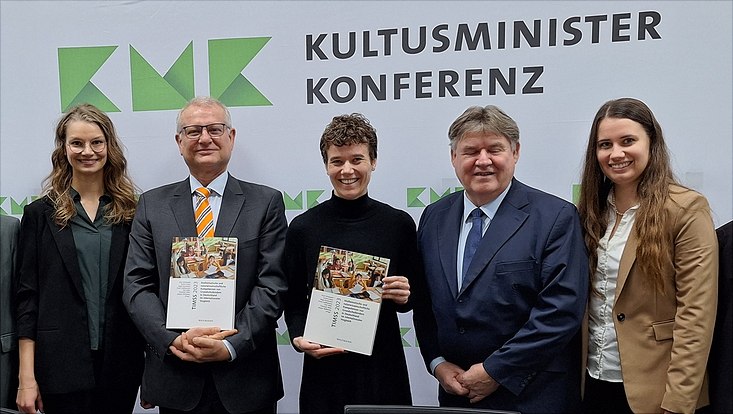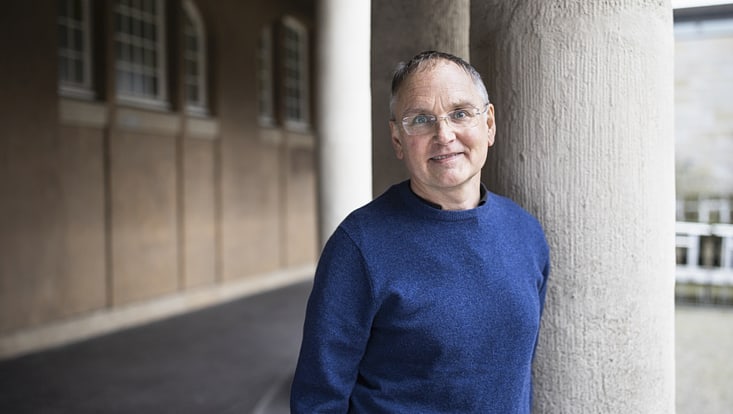TIMSS 2023 international studySTEM Success in Elementary Schools Despite Corona
4 December 2024, by Newsroom editorial office

Photo: UHH/Constanze Koschwitz
The Trends in International Mathematics and Science Study (TIMSS) for 2023 given to fourth graders in Germany shows consistent performance in mathematics and the natural sciences when compared to 2019, despite pandemic restrictions in 2020 and 2021. This is one of the studies presented in Berlin on 4 December. It was headed by Prof. Dr. Knut Schwippert from the University of Hamburg.
In 2023, Germany ranked internationally, as it did in 2019 and 2015, in the middle. The long-term trend starting in 2007 does not show any changes in Germany with regard to math skills, while there is a decrease in natural sciences competencies. In both fields, there remains a close correlation between a family’s socioeconomic status and their children’s academic success. This finding has remained stable since 2007. The number of students who do not fulfill the minimum criteria is also extremely high in both areas. In the natural sciences, there has even been a slight downwards trend.
The TIMSS 2023 study published on 4 December 2024 has analyzed fourth graders’ math and natural science skills internationally every 4 years since 2007.
“Educational success depends on social background”
Cem Özdemir, federal minister for education and research, explains: “School children were able to maintain their levels of skills after the pandemic. This is good news and an achievement for committed teachers in Germany who gave their best during pandemic-related school closures. We have them to thank that we cannot see any general COVID effect in school performance. TIMSS 2023 also shows, however, how dependent on social background educational success remains. And there are still significant differences in achievement between children with and without migration backgrounds. As a country of immigrants, we cannot afford this and we must make sure that the education system does justice to our heterogeneous society. Furthermore, one in four elementary schoolchildren does not fulfill the requirements in math, and one third fails to do so in the natural sciences. Our Startchance Program aims to improve equal opportunity in education and to purposefully strengthen basic skills. The MINT-Aktionsplan 2.0 will strengthen STEM skills along the entire educational path. We are beginning with STEM education very early on, for example, with the Little Scientists Foundation. This is because we must once again interest children for STEM and from the very beginning. So that our children not only maintain their skills but also build upon them, the federal and state governments must further expand their cooperation. The Federal Republic of Germany needs the Digitalpakt 2.0.”
Christine Streichert-Clivot, president of the Standing Conference of the Ministers of Education and Cultural Affairs of the Länder in the Federal Republic of Germany, says: “It is very good news that fourth graders’ skills in math and the natural sciences, in comparison to the study in 2019, have remained relatively unchanged and above the international average. Today’s findings show that school pupils have been able to make up for lost time immediately following the COVID-19 pandemic. The significant increase in students who reach the highest levels of math is also reason to celebrate. Unfortunately, the number of students at lower levels in math, at one in four, and in the natural sciences, at one in three, may be average internationally but it is still clearly too high. We need to keep on working. The QuaMath—Unterrichts- und Fortbildungsqualität in Mathematik entwickeln program to improve math lessons, and which the German states will fund for 10 years (starting in 2023), is an important step in the right direction. The initiative supports math teachers who who promote mathematical skills by offering a qualifications program and developing classroom materials.”
Karin Prien, minister for general and vocational education, science, research and culture for Schleswig-Holstein: “TIMSS 2023 shows how important it is to strengthen basic skills. Our measures, such as the purposeful support for STEM projects and better advanced training opportunities for teachers are now paying off. The findings of the TIMSS study also prove again: teachers are and remain the most important factor for successful education and teachers’ commitment during and after the pandemic have contributed decisively to the constancy of school children’s performance in Germany, which is above-average in international comparisons. It is also good news that Germany has caught up with digital media supplies: the increase in Germany was the largest in the international comparison. This is good news and an important condition for improving the use of digital teaching resources in the classroom in the future, because this is where Germany needs to still catch up. Of major importance now is the impending finalization of the DigitalPakt Schule 2.0 so that Germany can keep up internationally.”
Dr. Stefanie Hubig, minister for education in Rheinland-Pfalz, adds: “When you consider that the fourth graders who took part in the TIMSS 2023 could not learn in person for a long time due to the pandemic, then it is an achievement that the findings compared to 2019 have remained stable. The good news, also in view of other comparative studies, was not necessarily something to be expected. The study also suggests that our decisions in the 2020 pandemic year and afterwards seemed to have been fruitful: advocating for the quickest possible reopening of schools and the measures in our ‘catching up after corona’ plan.” Clearly teachers worked especially hard to prevent students from falling behind or to make up for lost time. I am very thankful to them for this; they made a huge, outstanding contribution to all of society to ameliorate the consequences of the pandemic.”
State secretary Rainer Schulz, head of office for the Hamburg Ministry of School and Vocational Education, representing the The Standing Conference of the Ministers of Education and Cultural Affairs of the Länder in the Federal Republic of Germany (KMK), says: “As with the earlier TIMSS cycles, in 2023 we see a close connection between social background and level of skills in math and the natural sciences. And since 2007, the number of school children with immigrant backgrounds has been growing, and here we see the effects of the differences in the make-up of school children since the start of TIMSS. Against this backdrop, it is right that the federal and state governments have initiated a change towards equal opportunity for the development of skills: with the Startchance program, we have launched a €20-billion investment this year and for the next 10 years to support, above all, elementary schools in socially precarious situations with the goal of halving the number of school children who do not achieve minimum standards.”
The most important findings for Germany at a glance
For math:
- The average math skills for fourth-graders amounted to 524 points. This ranks significantly above the international average at 503 points and they are identical to the average for 22 participating EU countries [1] (524 points) and comparable to the 20 participating OECD countries (525 points). The performance level, in comparison to the TIMSS 2007 (525 points) and TIMSS 2019 (521 points), has remained stable.
- 8.3 percent of fourth-graders reached the highest level skill level (V); internationally 10.4 percent did; in the EU, 9.5 percent; and for the OECD, 11.5 percent. This is a significant increase from 2007 (5.6 percent) and 2019 (6 percent).
- The number of school children at the lowest skill levels (I and II) was 25.1 percent (internationally: 36.6 percent, EU: 26.4 percent; OECD: 27.1 percent). While this number, in comparison to 2019 (25.3 percent), has remained stable, in comparison to 2007 (21.6 percent) it is a significant increase, which is also traceable to an increase at the lowest skill level.
For the natural sciences:
- In the natural sciences, average skills at 515 points rank significantly higher than the international average (494 points) and are comparable with the participating EU countries (518 points). The OECD countries have significantly better averages (526 points). The performance level, compared to the TIMSS 2019 (518 points) is stable; however, it is significantly lower than the TIMSS 2007 level (528 points), as it was in 2019.
- 8.7 percent of fourth graders reached the highest performance level (internationally: 8.3 percent; EU: 7.9 percent; OECD: 10.2). This number does not deviate significantly from that of 2007 (9.6 percent) or 2019 (6.9 percent).
- 29.7 percent of fourth-graders have only a rudimentary performance level (internationally: 38.7 percent; EU: 27.9 percent; OECD: 25.4 percent). While this number, in comparison to 2019 (27.7 percent), has remained stable, in comparison to 2007 (23.7 percent) it is a significant increase.
Further findings:
- 58 percent of fourth-graders have a positive view of math; for the natural sciences, it is 70.6 percent. Despite a regressive trend in comparison to 2019 (math: 64.9 percent, natural sciences: 74.1 percent) and 2007 (math: 69.9 percent, natural sciences: 80.7 percent), the number is still high.
- Of math teachers, 63.6 percent report that digital media are available to them for lessons (internationally: 48.2 percent; EU: 54.0 percent; OECD: 6.1 percent); in the natural sciences, 82.6 percent of teachers say they do. 60.5 percent; EU: 66.6 percent; OECD: 73.7 percent). Despite significant availability, digital media are used to date only to a limited extent.
- In math, there were, as in 2007 and 2019, significant gender-specific differences that favored boys. There have been so significant differences in the natural sciences since 2023. This, however, is due to boys’ lower performance levels.
- Performance levels in math and in the natural sciences remain closely linked to social factors and background, with the number of students with special support needs remaining constant since 2011 and the number of children from immigrant backgrounds increasing since 2007.
Trends in International Mathematics and Science Study (TIMSS)—study
The TIMSS is an comparative international study of school performance coordinated and conducted by the International Association for the Evaluation of Educational Achievement (IEA). In Germany, the study is being conducted by a scientific consortium headed by Prof. Dr. Knut Schwippert (University of Hamburg).
Internationally, 58 countries took part in the TIMSS 2023, including 22 EU member states and 29 OECD states. The representative sample in Germany encompassed 4,442 fourth-graders at 230 schools. The fourth-graders’ participation was mandatory in Germany. Additionally, the students, teachers, school leadership, and parents and guardians received questionnaires. The obligation to complete these varied from German state to state.
See the University of Hamburg’s web pages for more information.


